-
 Bitcoin
Bitcoin $117500
2.15% -
 Ethereum
Ethereum $3911
6.19% -
 XRP
XRP $3.316
10.79% -
 Tether USDt
Tether USDt $1.000
0.01% -
 BNB
BNB $787.2
2.24% -
 Solana
Solana $175.2
4.15% -
 USDC
USDC $0.9999
0.00% -
 Dogecoin
Dogecoin $0.2225
8.40% -
 TRON
TRON $0.3383
0.28% -
 Cardano
Cardano $0.7868
6.02% -
 Stellar
Stellar $0.4382
9.34% -
 Hyperliquid
Hyperliquid $40.92
7.56% -
 Sui
Sui $3.764
7.63% -
 Chainlink
Chainlink $18.48
10.66% -
 Bitcoin Cash
Bitcoin Cash $582.1
1.88% -
 Hedera
Hedera $0.2601
6.30% -
 Avalanche
Avalanche $23.33
4.94% -
 Ethena USDe
Ethena USDe $1.001
0.02% -
 Litecoin
Litecoin $122.3
2.04% -
 UNUS SED LEO
UNUS SED LEO $8.969
-0.27% -
 Toncoin
Toncoin $3.339
0.86% -
 Shiba Inu
Shiba Inu $0.00001287
4.30% -
 Uniswap
Uniswap $10.43
7.38% -
 Polkadot
Polkadot $3.861
5.08% -
 Dai
Dai $1.000
0.02% -
 Bitget Token
Bitget Token $4.513
3.41% -
 Monero
Monero $267.7
-6.18% -
 Cronos
Cronos $0.1499
4.14% -
 Pepe
Pepe $0.00001110
5.15% -
 Aave
Aave $284.9
8.28%
What happens if my mining pool gets hacked?
If your mining pool gets hacked, you risk losing earnings, having personal data exposed, and facing disruptions in mining operations.
Jul 12, 2025 at 07:49 pm
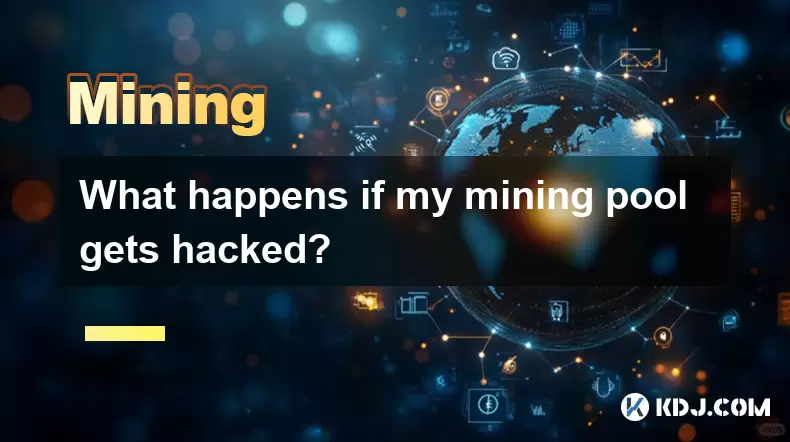
Understanding the Risks of Mining Pool Hacks
If your mining pool gets hacked, several critical issues can arise that directly affect your cryptocurrency operations. A mining pool is a collective group of miners who combine their computational power to increase the probability of successfully mining blocks and receiving rewards. When such a platform becomes compromised, it not only affects the pool operators but also every individual miner connected to it.
Security vulnerabilities in mining pools often stem from weak authentication systems, outdated software, or insufficient encryption protocols. Hackers may exploit these weaknesses to gain unauthorized access to user accounts, steal mining rewards, or manipulate the distribution system to redirect funds to their own wallets.
Immediate Consequences of a Compromised Mining Pool
Once a mining pool suffers a breach, miners may experience immediate loss of earnings. Funds that were supposed to be distributed among participants could be siphoned off by attackers before they reach legitimate users. This includes both mined coins and transaction fees associated with successfully mined blocks.
In addition to financial loss, personal information stored on the pool's server might be exposed. Many mining pools require users to provide email addresses, wallet addresses, and sometimes even IP addresses. If the database isn't properly encrypted, this data can be harvested and used for phishing attempts or identity theft.
Another critical issue involves compromised worker credentials. Miners typically connect to the pool using worker names and passwords. If these credentials are intercepted, attackers can impersonate legitimate miners, leading to further revenue loss and potential misuse of mining resources.
Impact on Mining Operations and Network Stability
A hacked mining pool can lead to disruptions in mining continuity. The pool may go offline temporarily while security patches are applied, or worse, continue operating with malicious code embedded within its system. During this period, miners lose valuable hashing time, which translates into missed opportunities for earning block rewards.
Moreover, the integrity of the blockchain network can be indirectly affected. If a large portion of the network’s hash rate is controlled by a compromised pool, there's an increased risk of double-spending attacks or 51% attacks. While rare, such scenarios undermine trust in the decentralized nature of cryptocurrencies.
Miners might also experience unusual behavior in their mining software, such as unexpected difficulty adjustments or erratic hashrate reporting. These anomalies can confuse miners and make it difficult to assess performance accurately.
Steps to Take if Your Mining Pool Is Compromised
- Immediately change all login credentials associated with your mining account.
- Review your payout history to ensure no unauthorized withdrawals have occurred.
- Check for suspicious activity in your mining dashboard, including unrecognized workers or changes in payout addresses.
- Update your mining software to the latest version to patch any known vulnerabilities.
- Enable two-factor authentication (2FA) if it's supported by the pool service.
- Contact the pool administrator to report the incident and seek clarification on what data may have been affected.
It's essential to act swiftly and methodically when dealing with a compromised mining environment. Delaying action increases the chances of further exploitation and loss.
Preventive Measures to Secure Your Mining Activities
To minimize the risks associated with mining pool hacks, adopting robust security practices is crucial. Start by choosing reputable mining pools with a proven track record of transparency and strong security measures. Research forums and community feedback before committing your resources.
Use unique and complex passwords for each mining service you join. Avoid reusing passwords across different platforms, as a breach on one site can expose multiple accounts.
Implement hardware wallets for storing mined cryptocurrencies instead of keeping them in exchange-linked wallets or pool-specific balances. Hardware wallets offer offline storage and significantly reduce the risk of theft.
Additionally, monitor your mining activities regularly through trusted monitoring tools. Set up alerts for unusual spikes in hashrate or sudden drops in expected payouts, which could signal tampering.
Frequently Asked Questions (FAQs)
Q: Can I recover stolen mining rewards after a pool hack?
Recovering stolen mining rewards depends on several factors, including how quickly the breach was detected, whether the pool operator has insurance or compensation policies, and if law enforcement agencies can trace the stolen funds. In many cases, recovery is extremely difficult due to the pseudonymous nature of blockchain transactions.
Q: How do I know if my mining pool has been hacked?
Signs of a compromised mining pool include unexpected changes in payout addresses, missing rewards without explanation, unexplained fluctuations in hashrate, or receiving phishing emails claiming to be from the pool. Always cross-check announcements via official communication channels.
Q: Should I switch mining pools after a security incident?
Yes, switching pools after a confirmed or suspected hack is advisable, especially if the current pool lacks transparency about the breach or fails to implement timely security updates. Prioritize pools with strong community trust and active development.
Q: Are centralized mining pools more vulnerable than decentralized ones?
Centralized mining pools are often targeted because they represent single points of failure. Decentralized mining solutions, although still emerging, distribute control and reduce the likelihood of mass breaches. However, they may come with trade-offs in terms of usability and reward consistency.
Disclaimer:info@kdj.com
The information provided is not trading advice. kdj.com does not assume any responsibility for any investments made based on the information provided in this article. Cryptocurrencies are highly volatile and it is highly recommended that you invest with caution after thorough research!
If you believe that the content used on this website infringes your copyright, please contact us immediately (info@kdj.com) and we will delete it promptly.
- XRP ETF, Bitcoin ETF, and Japan: A New Era for Crypto Investing?
- 2025-08-08 14:30:12
- Crypto, Congress, and Bills: Navigating the Regulatory Landscape in 2025
- 2025-08-08 14:30:12
- Union Jack Oil, Unused Gas, and Bitcoin: A New York Minute on UK's Crypto-Energy Play
- 2025-08-08 14:50:12
- Bitcoin Price: Bullish Flag Points to $123K Breakout?
- 2025-08-08 14:50:12
- Crypto Group's WNBA Dildo Toss: Meme Coin Mania or Just Plain Dumb?
- 2025-08-08 14:55:13
- Stablecoins, Hong Kong, and On-Chain Finance: Navigating the Regulatory Maze
- 2025-08-08 12:30:12
Related knowledge
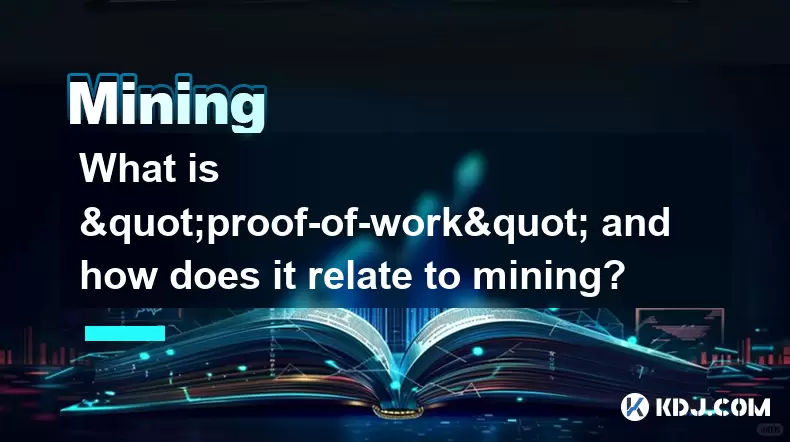
What is "proof-of-work" and how does it relate to mining?
Aug 07,2025 at 02:03pm
Understanding the Concept of Proof-of-WorkProof-of-work (PoW) is a consensus mechanism used in blockchain networks to validate transactions and secure...
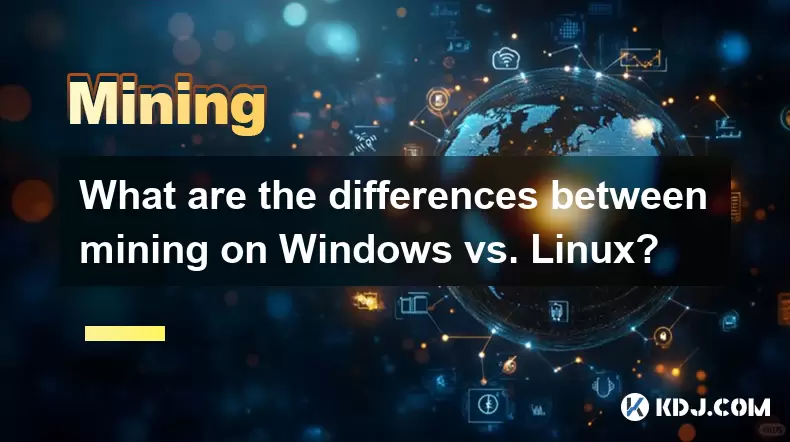
What are the differences between mining on Windows vs. Linux?
Aug 06,2025 at 11:29pm
Overview of Cryptocurrency Mining PlatformsCryptocurrency mining involves using computational power to solve complex cryptographic puzzles and validat...
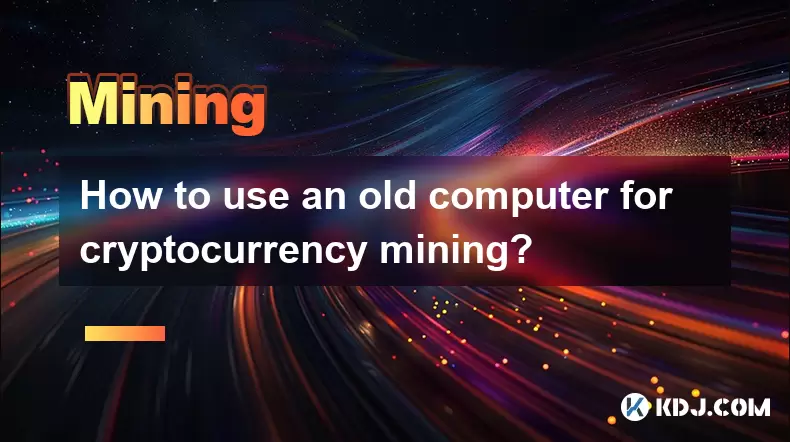
How to use an old computer for cryptocurrency mining?
Aug 07,2025 at 12:42pm
Understanding the Feasibility of Using an Old Computer for MiningUsing an old computer for cryptocurrency mining may seem outdated, but it is still te...
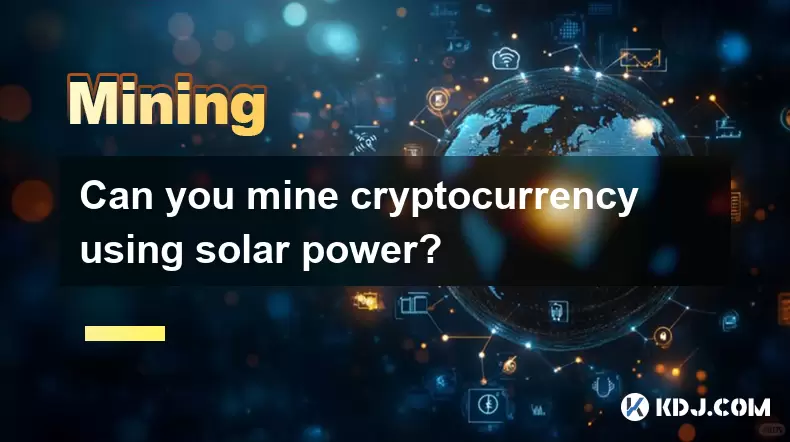
Can you mine cryptocurrency using solar power?
Aug 07,2025 at 12:00am
Understanding the Basics of Cryptocurrency MiningCryptocurrency mining involves validating transactions on a blockchain network by solving complex cry...
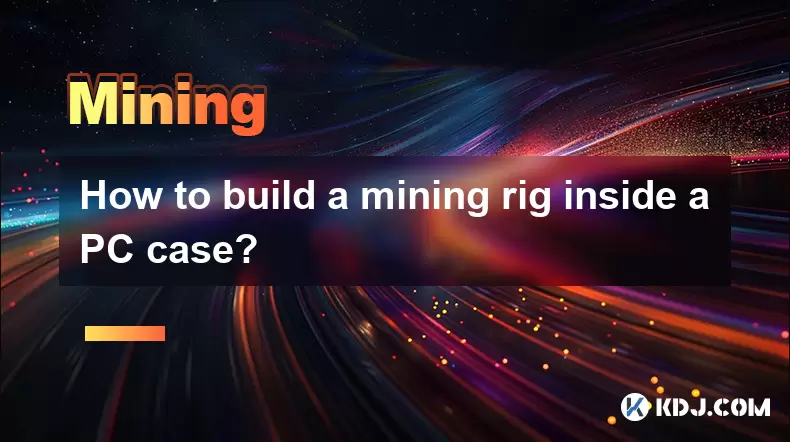
How to build a mining rig inside a PC case?
Aug 06,2025 at 11:01pm
Understanding the Basics of a Mining Rig in a PC CaseBuilding a mining rig inside a PC case involves transforming a standard computer chassis into a d...

What are the best cryptocurrencies to mine with an ASIC?
Aug 08,2025 at 01:22am
Understanding ASIC Mining and Its Role in CryptocurrencyASIC stands for Application-Specific Integrated Circuit, a specialized hardware designed to pe...

What is "proof-of-work" and how does it relate to mining?
Aug 07,2025 at 02:03pm
Understanding the Concept of Proof-of-WorkProof-of-work (PoW) is a consensus mechanism used in blockchain networks to validate transactions and secure...

What are the differences between mining on Windows vs. Linux?
Aug 06,2025 at 11:29pm
Overview of Cryptocurrency Mining PlatformsCryptocurrency mining involves using computational power to solve complex cryptographic puzzles and validat...

How to use an old computer for cryptocurrency mining?
Aug 07,2025 at 12:42pm
Understanding the Feasibility of Using an Old Computer for MiningUsing an old computer for cryptocurrency mining may seem outdated, but it is still te...

Can you mine cryptocurrency using solar power?
Aug 07,2025 at 12:00am
Understanding the Basics of Cryptocurrency MiningCryptocurrency mining involves validating transactions on a blockchain network by solving complex cry...

How to build a mining rig inside a PC case?
Aug 06,2025 at 11:01pm
Understanding the Basics of a Mining Rig in a PC CaseBuilding a mining rig inside a PC case involves transforming a standard computer chassis into a d...

What are the best cryptocurrencies to mine with an ASIC?
Aug 08,2025 at 01:22am
Understanding ASIC Mining and Its Role in CryptocurrencyASIC stands for Application-Specific Integrated Circuit, a specialized hardware designed to pe...
See all articles

























































































